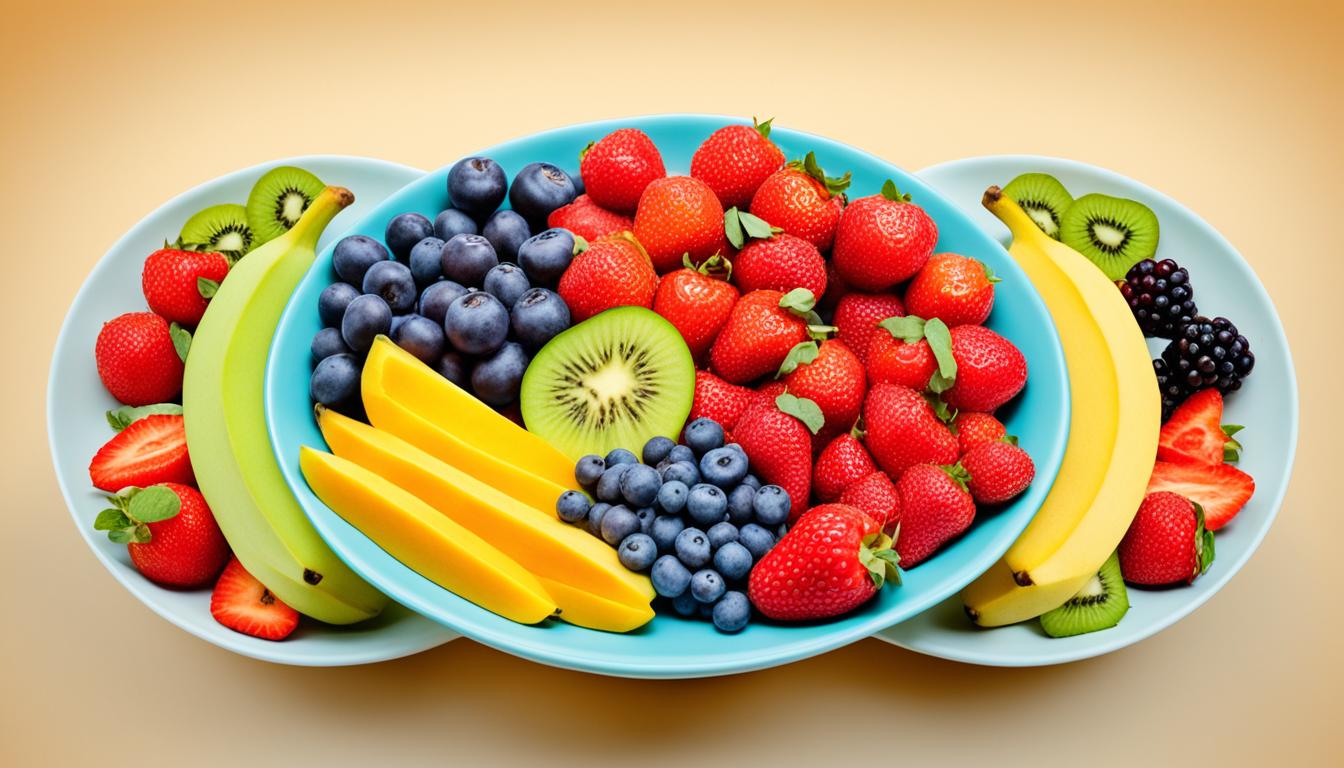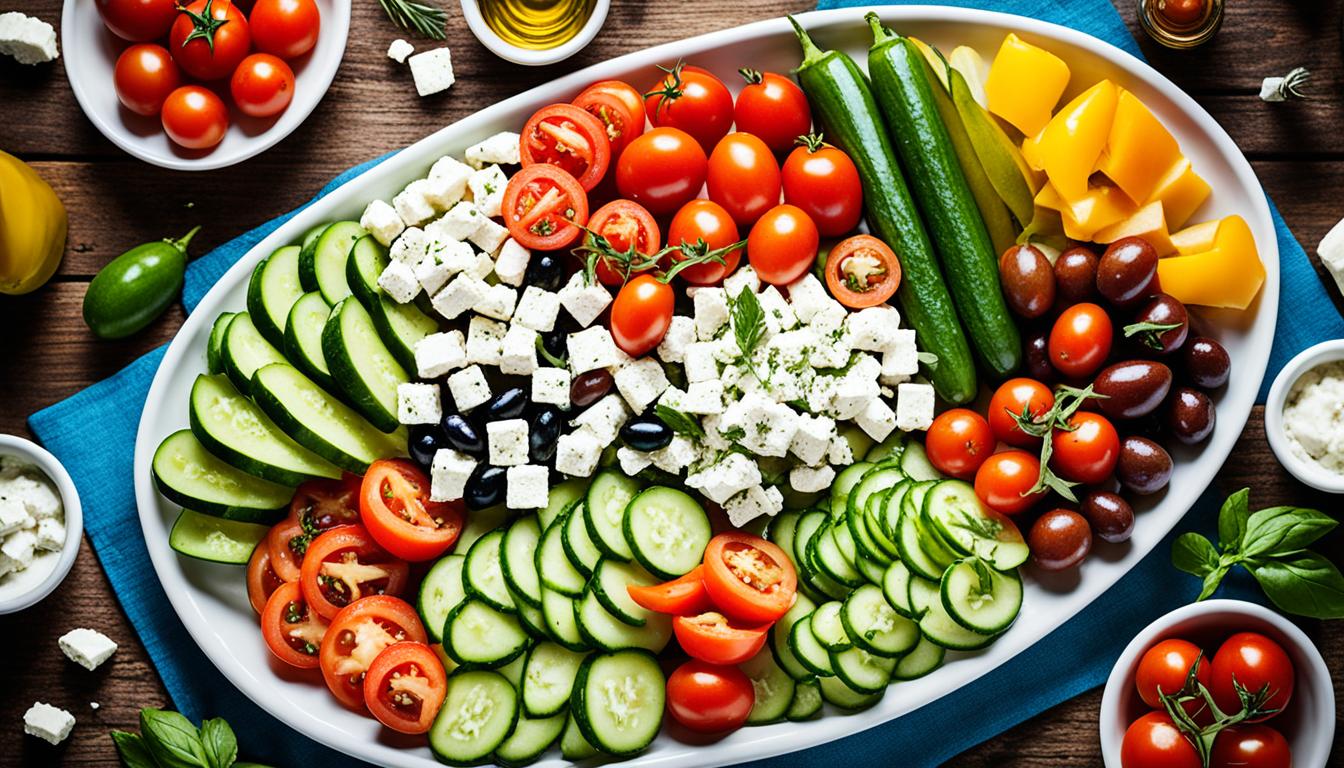Watermelon is a favorite in the summer, known for being juicy and sweet. What many don’t realize is that it’s low in carbs, with only 7.55g per 100g. This makes it perfect for those doing low-carb diets or following a keto-friendly plan. Adding low-carb fruits and veggies to your meals helps you meet your diet needs. They also give you important vitamins and nutrients.
Eating enough fruits and vegetables every day can be hard. But, it’s crucial for our health. They provide key nutrients and can lower your chances of diseases like cancer. Most fruits and veggies are low in fat and calories, good for those watching their weight. However, if you’re on a low-carb diet, you might worry about their carb content. It’s true that fruits and veggies have carbs, but picking the right ones in the right amounts is smart. This way, you get the health perks of these tasty foods while keeping your carb intake low.
Key Takeaways
- Watermelon is one of the lowest-carb fruits, containing only 7.55g of carbohydrates per 100g.
- Berries, such as strawberries and blackberries, are popular low-carb fruit options.
- Avocados are a surprising low-carb fruit, containing just 1.83g of net carbs per 100g.
- Cantaloupe and honeydew melon are refreshing low-carb fruit choices.
- Incorporating a variety of low-carb fruits into your diet can support your weight loss goals.
Introduction to Low Carb Fruits
Some eating plans suggest staying away from fruit for a while. This is because fruits are high in carbs, mostly due to natural sugars. Yet, if your doctor hasn’t warned you about fruit, you can probably add low carb fruits to your meals. Doing this helps you get essential vitamins, minerals, and fiber. These nutrients are key for staying healthy.
Benefits of Incorporating Low Carb Fruits in Your Diet
Adding low carb fruits to your meals has several upsides. They are low in carbs and rich in fiber. This combo keeps you full and helps keep your blood sugar level. Plus, the vitamins, minerals, and antioxidants in them are good for your health.
Importance of Fruits for Overall Health
Fruits, including low carb fruits, play a big role in a good diet. They offer vital nutrients that help your body work well. From boosting your immune system to keeping your skin and eyes healthy, they do a lot. Eating a mix of fruits ensures you get all the vitamins, minerals, and other good stuff they have.
Choosing the Right Low Carb Fruits
Picking the best low carb fruits is crucial when you’re watching your carbs. It’s wise to look at their net carb content. This is the total carbs minus fiber. Going for low carb fruits with less net carbs lets you enjoy their sweetness and health benefits within your carb limit.
What Are Net Carbs?
Net carbs show how many carbohydrates matter for your blood sugar. Your body can’t use fiber as sugar. So, when you eat, you can ignore the fiber’s carbs. Subtract a food’s fiber from the total carbs to find its net carbs. This tip is key for anyone on a low-carb diet.
Understanding the Concept of Net Carbs
For those eating low-carb or keto, understanding net carbs is crucial. Net carbs are the carbs your body uses, not including fiber. Fiber is great for your gut without raising sugar like carbs. By knowing net carbs, you can enjoy low-carb veggies and fruits under your carb limit.
Calculating Net Carbs in Fruits
To find the net carbs in fruits, you deduct the fiber grams from the total carbs. For instance, if a fruit has 10 total carbs and 3 grams of fiber, there are 7 net carbs (10 – 3 = 7). It’s a simple way to choose lower-carb fruits.
Knowing this helps you pick low-carb fruits wisely. You can savor their sweetness and nutrition while keeping within your carb limit.
| Fruit | Total Carbs (per 100g) | Fiber (per 100g) | Net Carbs (per 100g) |
|---|---|---|---|
| Watermelon | 7.55g | – | 7.55g |
| Strawberries | 7.68g | 2.0g | 5.68g |
| Blackberries | 9.61g | 5.3g | 4.31g |
| Cantaloupe | 8.16g | 0.9g | 7.26g |
| Avocado | 8.53g | 6.7g | 1.83g |
| Honeydew Melon | 9.09g | 0.8g | 8.29g |
| Peaches | 10.1g | 1.5g | 8.6g |
Top 5 Low Carb Fruits
When on a low-carb diet, know the carbs in the fruits you eat. Luckily, many fruits are low in carbs. They’re sweet and help with weight loss. Here are five you should know about.
Watermelon: The Quintessential Low Carb Fruit
Watermelon is very low in carbs. It only has 7.55 g of carbs in each 100 g. Plus, it’s rich in vitamin A and water. This makes it filling while being low in calories. Eat watermelon as a snack, or use it in salads and drinks.
Berries: A Powerhouse of Nutrition
Berries are top picks for cutting carbs. For example, strawberries, blackberries, and raspberries have 4.31 g to 5.68 g net carbs in each 100 g. They’re full of nutrients and a great low-carb choice. Enjoy them alone, in yogurt, or in desserts.
Cantaloupe: A Refreshing Low Carb Melon
Cantaloupe is a low-carb choice, too. It offers 8.16 g of carbs and 0.9 g of fiber per 100 g. That’s only 7.26 g of net carbs. This melon is not just refreshing but also hydrating. Eat it on its own, or in salads and drinks.
Avocados: The Surprising Low Carb Fruit
Avocados are surprisingly low in carbs. They only have 1.83 g of net carbs per 100 g. They’re a good fit for low-carb diets. Add them to meals as a healthy fat source.
Honeydew: A Sweet and Hydrating Option
Honeydew melon is a low-carb option. It contains 9.09 g of carbs and 0.8 g of fiber in each 100 g. That’s just 8.29 g net carbs. It’s sweet and refreshing, perfect for low-carb snacks or mixed in with dishes.
Tips for Incorporating Low Carb Fruits in Your Diet
Low carb fruits are a good choice for a healthy diet. But, it’s key to watch your amounts. Even low-carb fruits have carbs. Understanding net carbs and choosing wisely will let you enjoy these fruits without going overboard on carbs.
Portion Control for Low Carb Fruits
Using low carb fruits in your diet means paying attention to how much you eat. Fruits like watermelon, berries, and cantaloupe are low in carbs. But, it’s vital to control your portions to meet your daily carb limit. Keep to about 1/2 cup of these fruits at a time.
Creative Ways to Enjoy Low Carb Fruits
Mixing low carb fruits in interesting ways can help you eat them more. Try blending cantaloupe with lime and mint for a tasty drink. Or, wrap prosciutto around honeydew melon for a fun snack. You can also add peaches to cottage cheese for something new. These ideas let you enjoy the benefits of low-carb fruits while keeping to your diet.
Low Carb Fruit vs. Fruit Juice
Fruit juices might seem good for you, but they’re filled with sugar and carbs. They don’t have much fiber either. Drinking them can quickly raise your blood sugar. Whole fruits, on the other hand, have fiber. This fiber helps sugar get into your blood slowly. So, when you’re on a low-carb diet, pick whole, low-carb fruits over fruit juices. They’re a better choice.
The Drawbacks of Fruit Juices
Fruit juices are often seen as a healthy drink. But, they can have more carbs and sugars than the whole fruit. This means they make your blood sugar jump and then drop quickly. That’s not good for a low-carb diet. Also, the process of making juice removes the fruit’s fiber. This makes sugar hit your blood even faster.
Choosing Whole Fruits Over Juices
If you want low-carb fruits, eat the whole fruit. It’s better for you than juice. The fruit’s fiber slows down sugar getting into your blood. This gives you more steady energy. It’s great for keeping your blood sugar level under control.
Other Low Carb Fruits to Consider
Besides the top 5 low carb fruits, you can also look at other choices. Peaches have 10.1 g carbs and 1.5 g fiber in each 100 g. This makes them a tasty low-carb option with 8.6 g net carbs. Raspberries are full of nutrition, providing 12 g of carbs and 5.3 g of fiber. After subtracting fiber, they only have 6.7 g of net carbs. Oranges offer a rich source of vitamin C and are easy to eat, but they also contain 12 g of carbs in 100 g.
Low Carb Fruits and Weight Loss
Low-carb fruits are great for losing weight. They are low in calories and have lots of fiber. This makes you feel full longer and cuts down on how much you eat.
Plus, the fiber helps slow down sugar going into your blood. This stops sugar highs and lows that can make you crave more food.
How Low Carb Fruits Support Weight Loss
The best thing about low carb fruits is their fiber content. They are low in carbs and high in fiber. This is perfect for a low-carb diet or if you’re aiming to lose weight.
This fiber keeps you feeling satisfied. So, you’re less likely to eat too much. It really helps with your weight loss efforts.
Balancing Carb Intake with Low Carb Fruits
If you add low-carb fruits to your diet, watch your carb total. It’s crucial to keep an eye on your carb intake and fruit portion sizes. This way, you stay on track with your daily carb goals.
Remember to check the net carb content of these fruits. Then, you can adjust how much you eat. This lets you enjoy their taste and nutrition while sticking to a low-carb lifestyle. It also helps with your weight loss plans.
Incorporating Low Carb Fruits into a Healthy Lifestyle
Low-carb fruits fit well into a healthy diet. Pair them with foods like leafy greens, lean proteins, and good fats. This makes your meals and snacks both filling and healthy.
Changing your choices of low-carb fruits adds variety to your diet. This brings different vitamins, minerals, and antioxidants to support your health.
Combining Low Carb Fruits with Other Healthy Foods
Add low-carb fruits to meals with other good ingredients. For instance, make a watermelon fruit pizza. Top watermelon slices with feta, basil, and balsamic glaze. Or create a strawberry-chocolate Greek yogurt bark with yogurt, strawberries, and dark chocolate.
Low Carb Fruit Recipes and Meal Ideas
Finding low-carb fruit recipes and meals can be fun. You might like a cocoa-chia pudding with raspberries, an avocado and pineapple salad, or a blueberry and spinach smoothie. Mixing low-carb fruits with other healthy foods lets you make tasty, nutritious dishes.
Conclusion
Adding low-carb fruits to your diet helps with weight loss while offering sweetness and nutrition. This includes knowing about net carbs and picking the best low-carb fruits. Practice serving sizes and enjoy these healthy sweet treats without stopping your progress.
Fruits low in carbs are great for losing weight. They are low in calories, rich in fiber, and make you feel full longer. Their fiber slows sugar absorption, keeping your blood sugar steady. This helps ward off cravings and overeating.
Eating a mix of low-carb fruits supports your weight loss journey. Stick to recommended serving sizes and mix these fruits with balanced meals. Doing this, you can relish the taste and benefits of fruits without adding unnecessary carbs.
FAQ
What are the benefits of incorporating low carb fruits into a diet?
How do I calculate the net carbs in fruits?
What are some of the top low-carb fruit options?
Are fruit juices a good option for a low-carb diet?
How can I incorporate low-carb fruits into a healthy lifestyle?
Source Links
- https://www.healthline.com/health/food-nutrition/low-carb-fruits-and-vegetables
- https://www.bbcgoodfood.com/howto/guide/our-top-10-best-low-carb-fruits
- https://pharmeasy.in/blog/low-carbohydrate-fruit-a-complete-guide-to-healthy-choices/
- https://www.healthline.com/nutrition/keto-fruit
- https://www.eatingwell.com/article/290638/low-carb-fruits-ranked-from-lowest-to-highest-carbs/
- https://www.webmd.com/diet/ss/slideshow-low-carb-fruits
- https://www.medicalnewstoday.com/articles/318601
- https://www.thelanby.com/blog/low-carb-fruits
- https://whfoods.com/stories/fruits-for-low-carb-diet/



